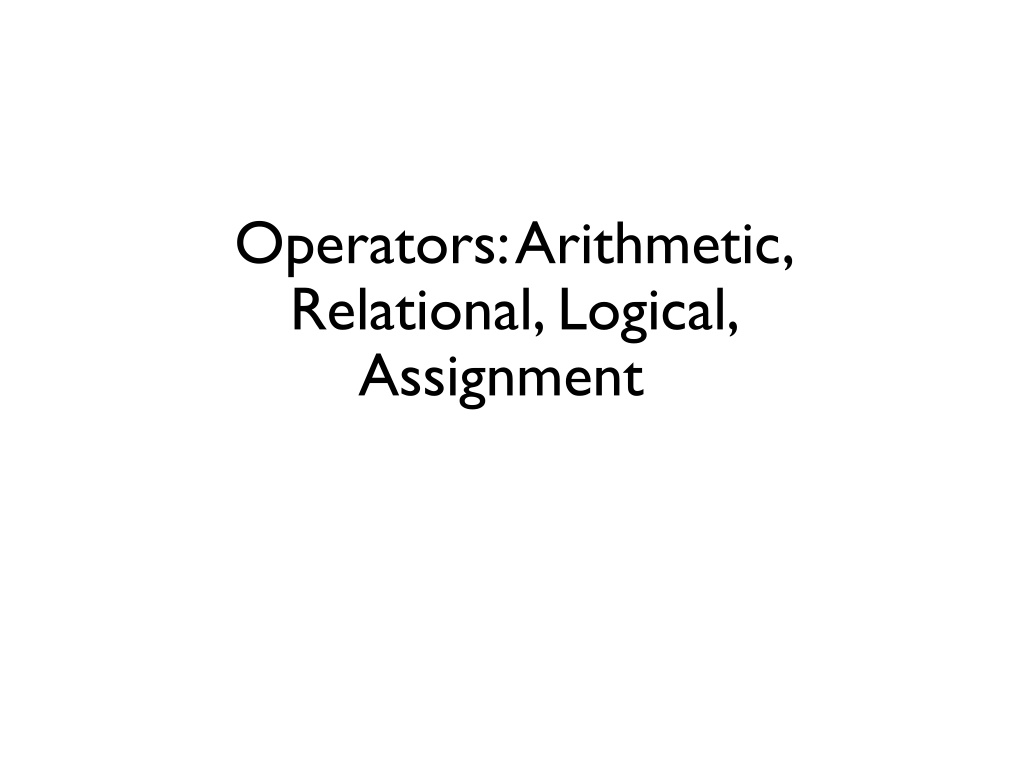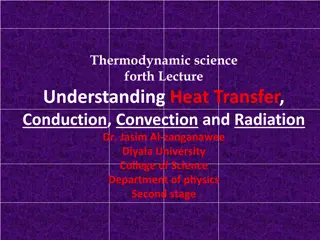
Understanding Arithmetic Operators, Precedence, and Associativity in C Programming
Learn about arithmetic operators (+, -, *, /, %), operator precedence, and associativity in C programming. Discover how to work with basic arithmetic expressions and the order of evaluation for different operators.
Download Presentation

Please find below an Image/Link to download the presentation.
The content on the website is provided AS IS for your information and personal use only. It may not be sold, licensed, or shared on other websites without obtaining consent from the author. Download presentation by click this link. If you encounter any issues during the download, it is possible that the publisher has removed the file from their server.
E N D
Presentation Transcript
Operators: Arithmetic, Relational, Logical, Assignment
Operators The different operators are: Arithmetic Relational Logical Increment and Decrement Bitwise Assignment Conditional 2
Arithmetic Operators The binary arithmetic operators are +, -, *, / and the modulus operator %. The / operator when used with integers truncates any fractional part i.e. E.g. 5/2 = 2 and not 2.5 Therefore % operator produces the remainder when 5 is divided by 2 i.e. 1 The % operator cannot be applied to float or double E.g. x % y wherein % is the operator and x, y are operands 3
The unary minus operator #include <stdio.h> int main () { int a = 25; int b = -2; printf( %d\n ,-a); printf( %d\n ,-b); return 0; } Output ? 4
The unary minus operator #include <stdio.h> int main () { int a = 25; int b = -2; printf( %d\n ,-a); printf( %d\n ,-b); return 0; } Output: -25 2 5
Working with arithmetic expressions Basic arithmetic operators: +, -, *, /, % Precedence: One operator can have a higher priority, or precedence, over another operator. The operators within C are grouped hierarchically according to their precedence (i.e., order of evaluation) 6
Working with arithmetic expressions Operations with a higher precedence are carried out before operations having a lower precedence. High priority operators * / % Low priority operators + - Example: * has a higher precedence than + a + b * c a+(b*c) If necessary, you can always use parentheses in an expression to force the terms to be evaluated in any desired order. 7
Working with arithmetic expressions Associativity: Expressions containing operators of the same precedence are evaluated either from left to right or from right to left, depending on the operator. This is known as the associative property of an operator Example: + has a left to right associativity For both the precedence group described above, associativity is left to right . 8
Working with arithmetic expressions #include <stdio.h> int main () { int a = 100; int b = 2; int c = 25; int d = 4; int result; result = a * b + c * d; //Precedence printf( %d\n ,result); result = a = (b + c * d);//Associativity printf( %d\n ,result); return 0; } Output: 300 102 10
Increment and Decrement Operators ++ and -- operator as prefix and postfix If you use the ++ operator as a prefix like: ++var, the value of var is incremented by 1; then it returns the value. If you use the ++ operator as a postfix like: var++, the original value of var is returned first; then var is incremented by 1. #include <stdio.h> Output: 5 6 int main() { int var1 = 5, var2 = 5; // 5 is displayed, Then, var1 is increased to 6. printf("%d\n", var1++); // var2 is increased to 6 , Then, it is displayed. printf("%d\n", ++var2); return 0; } 11
Increment and Decrement Operators #include <stdio.h> int main() { int a = 10, b = 100; float c = 10.5, d = 100.5; Output: ++a = 11 --b = 99 ++c = 11.500000 --d = 99.500000 printf("++a = %d \n", ++a); printf("--b = %d \n", --b); printf("++c = %f \n", ++c); printf("--d = %f \n", --d); return 0; } 12
Increment and Decrement Operators: Example What will be the output of the following C code? #include <stdio.h> int main() { Output: a = 2, b = 1, c=2 int a = 1, b = 1, c; c = a++ + b; printf( a=%d, b=%d, c=%d", a, b,c); } 13
Increment and Decrement operators Prefix Mode Postfix Mode Ex: Ex: m=5; m=5; y=m++; Postfix Mode y=++m; Prefix Mode Here y continues to be 5. Only m changes to 6. In this case, the value of y and m would be 6. Postfix operator ++ appears after the variable Prefix operator ++ appears before the variable. 14
Increment and Decrement operators Don ts: Attempting to use the increment or decrement operator on an expression other than a modifiable variable name or reference. Example: ++(5) is a syntax error ++(x + 1) is a syntax error 15
Relational operators Operator Meaning == Is equal to != Is not equal to < Is less than <= Is less or equal > Is greater than >= Is greater or equal The relational operators have lower precedence than all arithmetic operators: a < b + c is evaluated as a < (b + c) ATTENTION ! the is equal to operator == and the assignment operator = ATTENTION ! When comparing floating-point values, Only < and > comparisons make sense ! 16
Relational operators An expression such as a < b containing a relational operator is called a relational expression. The value of a relational expression is one, if the specified relation is true and zero if the relation is false. E.g.: 10 < 20 is TRUE 20 < 10 is FALSE A simple relational expression contains only one relational operator and takes the following form. ae1relational operator ae2 constants, variables or combinations of them. ae1 & ae2 are arithmetic expressions, which may be simple 17
Relational operators The arithmetic expressions will be evaluated first & then the results will be compared. That is, arithmetic operators have a higher priority over relational operators. > >= < <= all have the same precedence and below them are the next precedence equality operators i.e. == and != Suppose that i, j and k are integer variables whose values are 1, 2 and 3 respectively. Expression i<j (i+j)>=k (j+k)>(i+5) k!=3 j==2 Interpretation Value true true false false true 1 1 0 0 1 18
Logical operators Truth Table op-1 op-2 value of expression op-1&&op-2 op-1||op-2 Non-zero Non-zero 1 Non-zero 0 0 1 0 Non-zero 0 1 0 0 0 0 1 Operator Symbol Example expression1 && expression2 AND && expression1 || expression2 OR || !expression1 NOT ! The result of logical operators is always either 0 (FALSE) or 1 (TRUE) 19
Logical operators Expressions Evaluates As True (1) because both operands are true (5 == 5)&&(6 != 2) True (1) because one operand is true (5 > 1) || (6 < 1) False (0) because one operand is false (2 == 1)&&(5 ==5) True (1) because the operand is false ! (5 == 4) !(FALSE) = TRUE !(TRUE) = FALSE 20
Logical operators #include <stdio.h> int main() { int a = 5, b = 5, c = 10, result; Output result = (a == b) && (c > b); printf("(a == b) && (c > b) is %d \n", result); result = (a == b) && (c < b); printf("(a == b) && (c < b) is %d \n", result); result = (a == b) || (c < b); printf("(a == b) || (c < b) is %d \n", result); result = (a != b) || (c < b); printf("(a != b) || (c < b) is %d \n", result); result = !(a != b); printf("!(a != b) is %d \n", result); result = !(a == b); printf("!(a == b) is %d \n", result); return 0; } (a == b) && (c > b) is 1 (a == b) && (c < b) is 0 (a == b) || (c < b) is 1 (a != b) || (c < b) is 0 !(a != b) is 1 !(a == b) is 0 21
The assignment operators The C language permits you to join the arithmetic operators with the assignment operator using the following general format: op=, where op is an arithmetic operator, including +, , *, /, and %. Example: count += 10; Equivalent to: count=count+10; Example: precedence of op=: a /= b + c Equivalent to: a = a / (b + c) 22
Bitwise operators In arithmetic-logic unit (which is within the CPU), mathematical operations multiplication and division are done in bit-level. like: addition, subtraction, Operators & | ^ ~ << >> Meaning of operators Bitwise AND Bitwise OR Bitwise XOR Bitwise complement Shift left Shift right 23
Bitwise Operators Examples 12 = 00001100 (In Binary) 12 = 00001100 (In Binary) 25 = 00011001 (In Binary) 25 = 00011001 (In Binary) Bit Operation of 12 and 25 Bitwise OR Operation of 12 and 25 00001100 | 00011001 ________ 00011101 = 29 (In decimal) 00001100 & 00011001 ______ 00001000 = 8 (In decimal) 12 = 00001100 (In Binary) 25 = 00011001 (In Binary) 35 = 00100011 (In Binary) Bitwise complement Operation of 35 ~ 00100011 ________ 11011100 = 220 (In decimal) Bitwise XOR Operation of 12 and 25 00001100 ^ 00011001 ________ 00010101 = 21 (In decimal) Bitwise complement of any number N is -(N+1) 24
Conditional Operator The conditional operator is also known as a ternary operator. The conditional statements are the decision-making statements which depends upon the output of the expression. It is represented by two symbols, i.e., '?' and : . Syntax of a conditional operator Expression1? expression2: expression3; 25
Conditional Operator #include <stdio.h> int main() { int age; // variable declaration printf("Enter your age"); scanf("%d",&age); // taking user input for age variable (age>=18)? (printf("eligible for voting")) : (printf("not eligible for voting")); return 0; } 26
Conditional Operator #include <stdio.h> int main() { int a=5,b; // variable declaration b=((a==5)?(3):(2)); // conditional operator printf("The value of 'b' variable is : %d",b); return 0; } 27
Thank You!! 28












